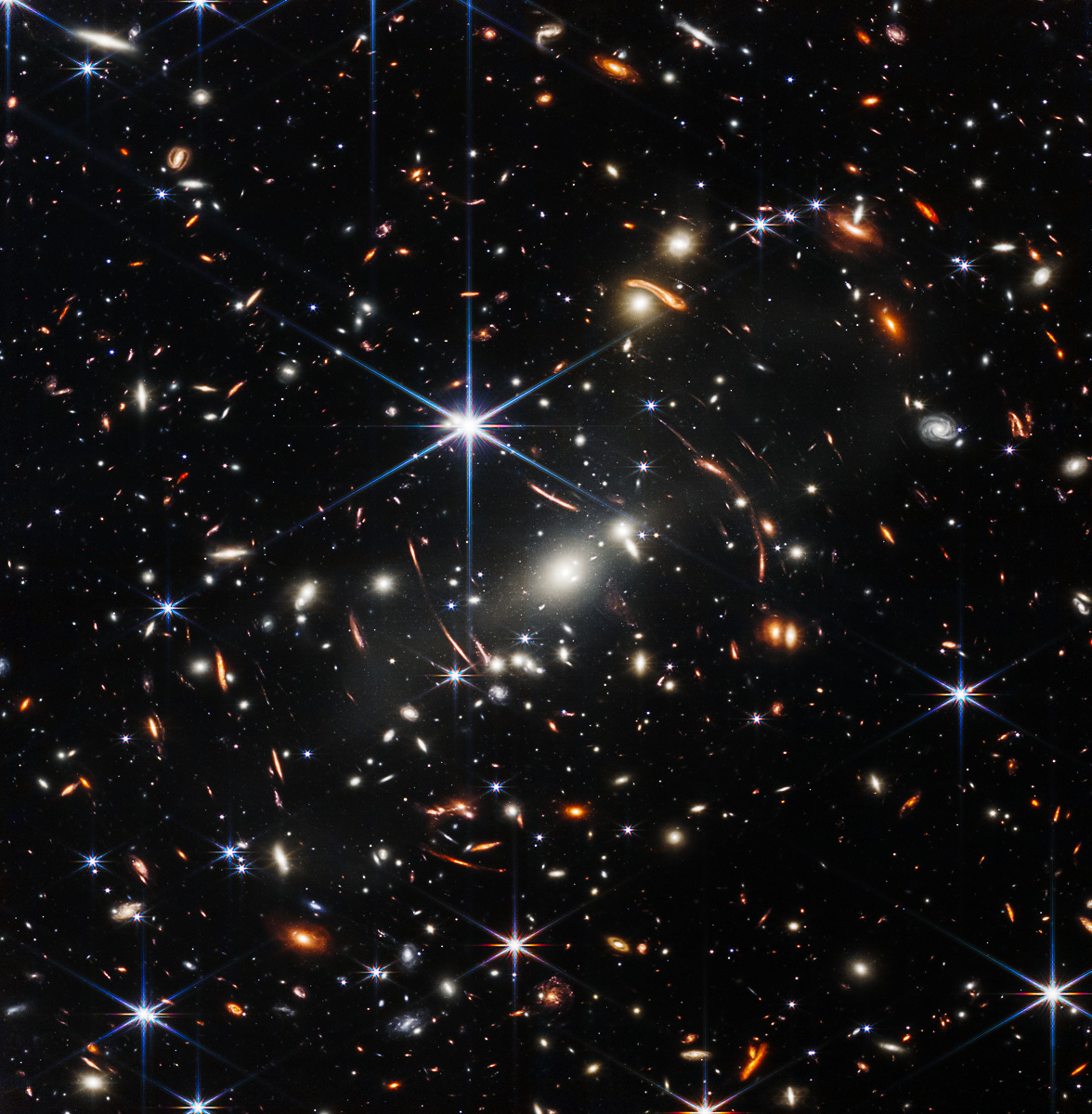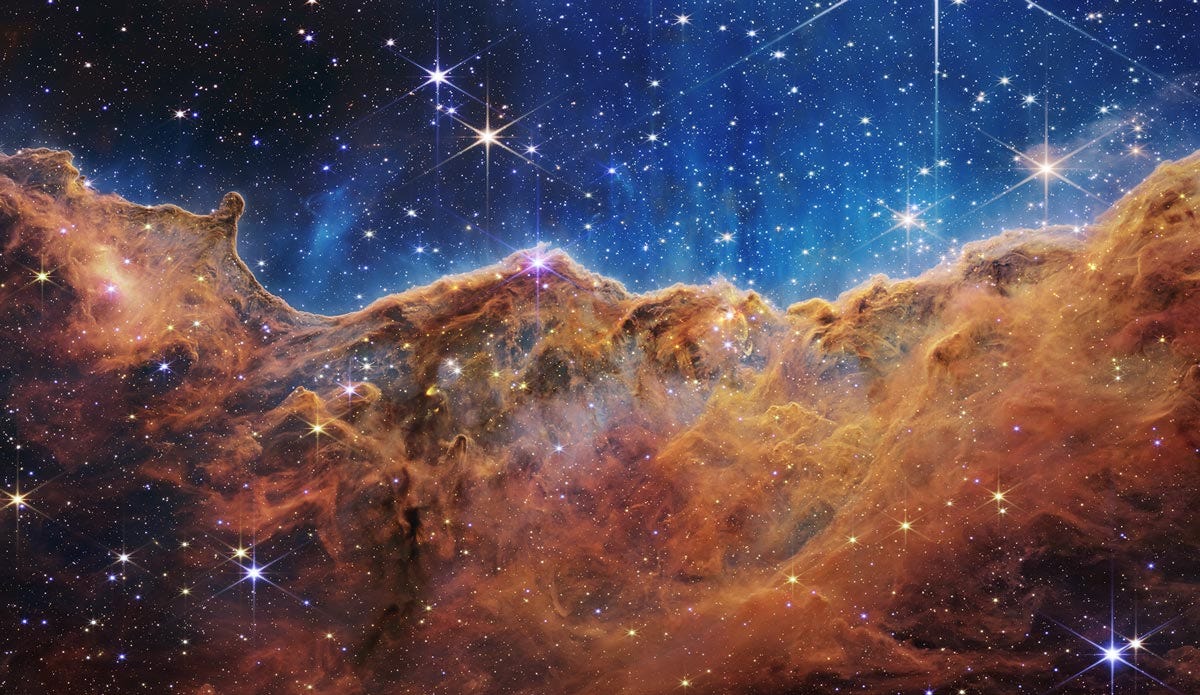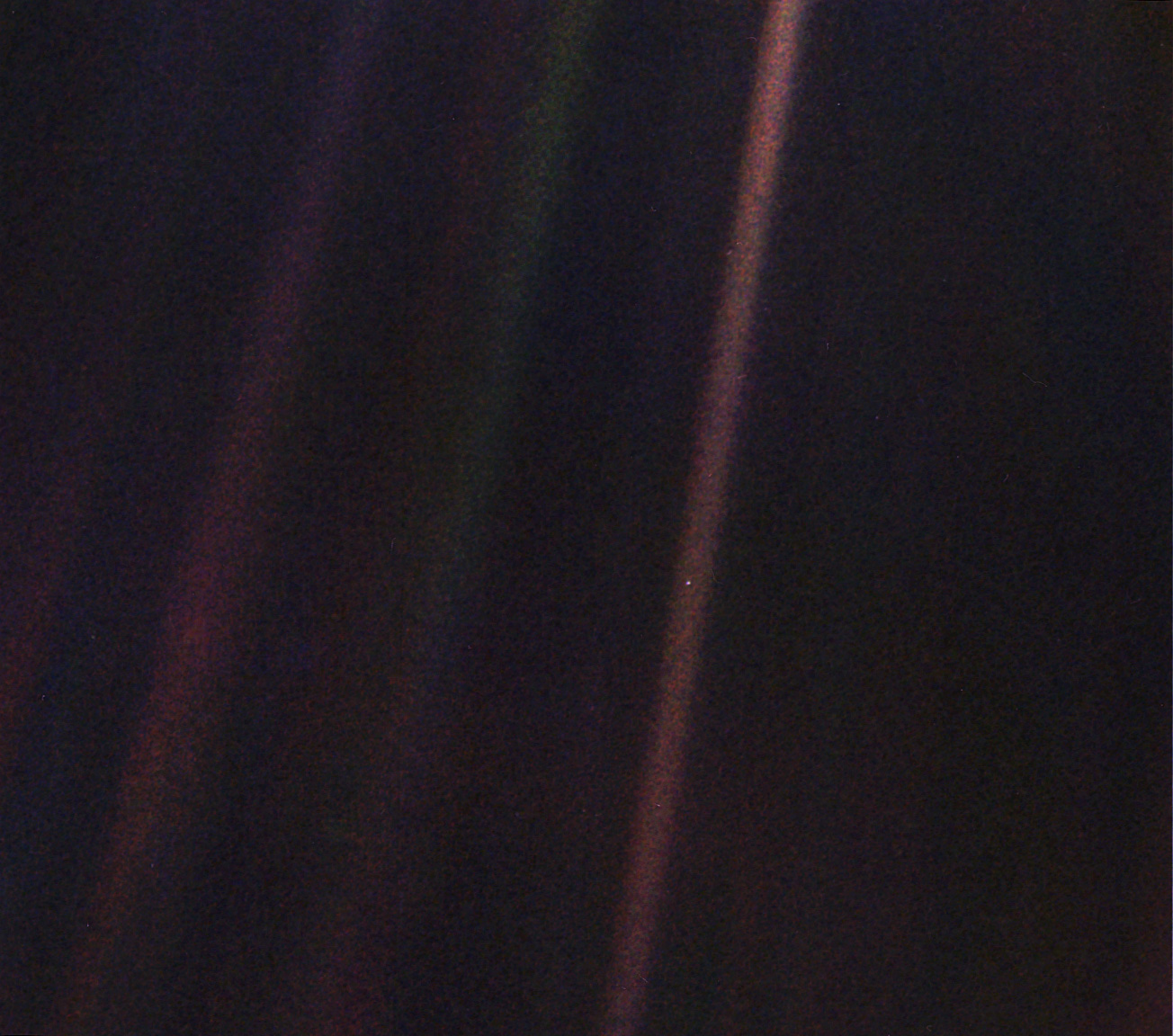The cosmic dance, as noticed by the James Webb Telescope
An invitation to listen

Note from NASA: Webb’s deep field image is approximately the size of a grain of sand held at arm’s length, a tiny sliver of the vast universe.
The heavens declare the glory of God, and the skies announce what his hands have made. Day after day they tell the story; night after night they tell it again. They have no speech or words; they have no voice to be heard. But their message goes out through all the world; their words go everywhere on earth.
The sky is like a home for the sun. The sun comes out like a bridegroom from his bedroom. It rejoices like an athlete eager to run a race. The sun rises at one end of the sky and follows its path to the other end. Nothing hides from its heat.
Psalm 19: 1-6 (NCV)
My pandemic TV show binge was Stargate SG-1. A team of headstrong cosmic explorers, hurtling through a network of wormholes on galactic adventures, in pursuit of alien technology and extraterrestrial, anthropological insights. Sign. Me. Up. While wonderful in its own way, the quality of the show’s late 90’s CGI isn’t even in the same universe as the images released from the James Webb Telescope this past week. This telescope is orbiting our sun and making the deepest images of the galaxy we have ever seen. The images are incredible and have both news writers and scientists sounding like ancient Hebrew poets.

C.S. Lewis commented that if his Space Trilogy left any lasting impact on the world, he hoped it helped us shift from calling the expanse above us “Space” and return to the language of “the heavens” – as used in Psalm 19, recapturing a pre-modern imagination. We are people of imagination; and language sparks particular imaginations about specific particulars. Words create worlds. Lewis’ lasting idea is that our galaxy is caught up in a cosmic dance with the entire universe and we are ignorant of the songs, stories, and histories of the planets and galaxies just outside of our stratosphere. Our neighbors have stories we have never heard.
Our physical bodies are affected by these celestial objects. We wake when our planet turns towards our star. We go to sleep when our planet turns away from it. Female menstruation and fertility is linked to the lunar cycle. The rhythms of planting and harvesting are dependent on the weather. We will never conquer the universe.
I am in a faith tradition that says the creator of this universe loves each and every one of us. While I honor the tradition handed to me, I hold it humbly – aware that my understanding is limited. As a human being, on planet Earth, I have an understanding of context approximately the size of a grain of sand held at arm’s length, a tiny sliver of the vast universe.
There was a point in human history where we believed the heavens revolved around our planet. We were wrong. We went on to the belief that the heavens revolved around our star. We, again, were wrong. Earth is simply a pale blue dot as Carl Sagan told us after Voyager 1 sent back this image of our home planet:
If there is a cosmic dance going on – and I believe our eyes and telescopes are telling us that there is – then there is some sort of cosmic music they are dancing to. The movements are in harmony – not chaos. Superstring theory tells us that all particles of matter are tiny, vibrating strings. The music, then, is inside of everything and present in us; but, in order to participate in the cosmic dance, we have to listen.
The Latin audire is where we get our word listen. If we intently listen, it’s called ob-audire – the root of our word obedience. To truly listen is to obey.
As a Christian, I believe that our Creator calls us to listen to him. I believe the Spirit moves at the subatomic level. We hear with our ears, but truth — the just, good, and beautiful — resonates in our bones. Early on in the Jesus story, this prayer was given to the children of Israel:
Listen, Israel, the Lord is our God, the Lord alone, and you shall love the Lord your God with all your heart, all your being, and all your might.
The Shema is a prayer that has been sung for thousands of years. A point to orient us.
When we don’t listen, we can’t hear the music. If we can’t hear the music, we can’t dance. The Latin surdus (deaf) combined with absurdus (out of tune) and became root of our word absurd. The writer Henri Nouwen put it this way:
The more deaf we get, the more absurdus we become, and an absurd life is precisely a life in which we no longer listen and are constantly distracted by all sorts of voices and lose touch with the truth that we are the beloved. And as soon as we start to become spiritually deaf to the voice that calls us the beloved, we are going to look someplace else to make us the beloved. And that’s when we get into trouble. We are going to look for love, affirmation, or praise where we cannot find them and get hooked in all sorts of ways, whether it is alcohol, drugs, relationships, success in work, how people talk about us, or desire to have control over things. Real freedom to live in this world comes from hearing clearly the truth about who we are, which is that we are the beloved.”
If the entire universe is dancing and we choose to not listen and join, that really would be absurd.


I am enjoying reading your wisdom, Adam. I wonder if we will get to the place of referring to both the triune and creator God without male pronouns. ‘He’ feels like too small a box to me.